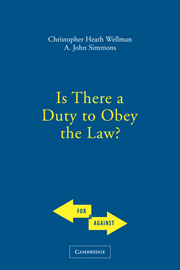6 - The Theories
Published online by Cambridge University Press: 05 June 2012
Summary
Three Families
In the discussion that follows, I will defend a division of the available theories of the duty to obey the law into three groups or “families.” This division will allow me (in this section) to discuss the merits and difficulties of two of these families briefly and in very general terms, largely summarizing arguments that I have made before. In particular, I will distinguish (what I call) Associative, Transactional, and Natural Duty theories of a duty to obey. Associative accounts ground our duty to obey in our nonvoluntary occupation of certain duty-laden social roles, while Transactional accounts ground our duty (or obligation) to obey in our morally significant interactions with our states or fellow citizens. I will attempt (in this chapter) to explain and deal with these first two families of theories by revealing what I take to be the fatal defects that infect all possible members of the families, saving my more detailed discussion and criticism for the last family. Chapter 7 will then be devoted to a much more careful examination of the third – and currently the most popular – of these families of theories. Natural Duty theories of the duty to obey the law are those that ground our duty to obey not in who we are (as in Associative accounts) or in what we've done or enjoyed (as in Transactional accounts), but rather either (a) in the moral importance of advancing some impartial moral good or (b) in some moral duty thought to be owed by all persons to all others as moral equals, regardless of roles, relationships, or transactions.
- Type
- Chapter
- Information
- Is There a Duty to Obey the Law? , pp. 102 - 120Publisher: Cambridge University PressPrint publication year: 2005



